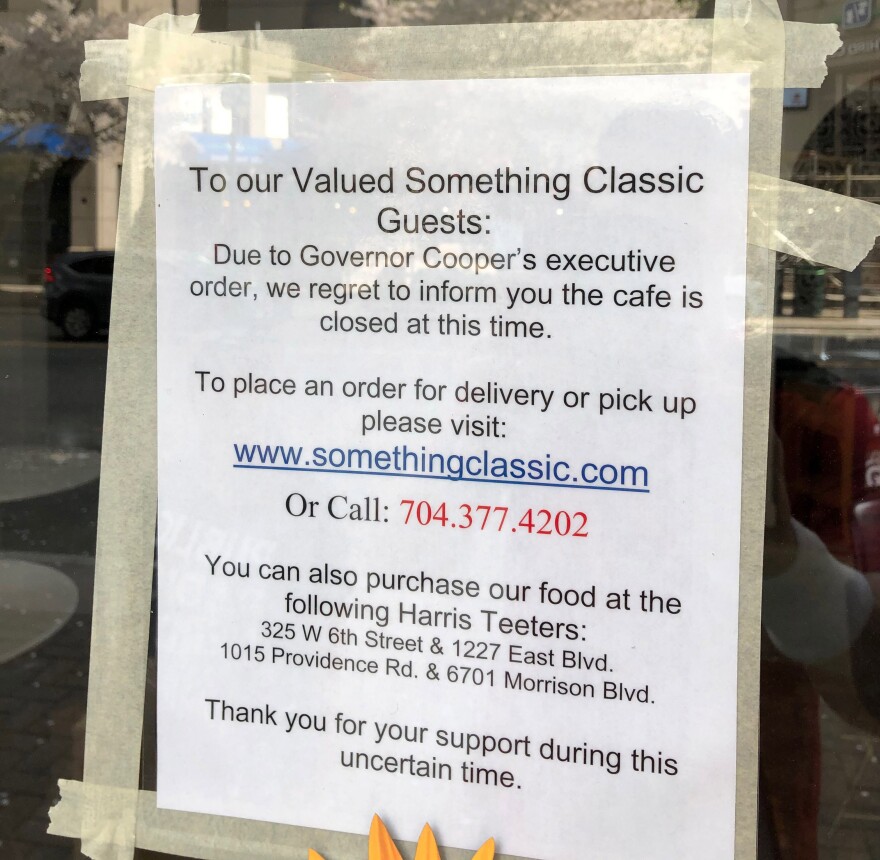RALEIGH — North Carolina's restaurant and hotel operators pleaded Tuesday for state financial aid and tax relief as closings and travel restrictions from the new coronavirus have thrown more than 370,000 of their employees out of work.
Speaking to a state House committee on the virus-induced economic contraction, hospitality industry leaders said expanded unemployment benefits and assistance approved in Washington won't come soon enough.
“The funding is weeks away and North Carolina businesses, we need help now,” Amber Moshakos with Raleigh-based LM Restaurants said during the video conference meeting. Twenty-one LM-owned restaurants in North Carolina employ over 1,700 workers. Moshakos said reducing the workforce to less than 100, as a statewide order limiting restaurants to takeout and delivery began, marked the hardest day in the family-owned company's 42-year history.
North Carolina reported about 1,500 positive COVID-19 cases as of Tuesday, an increase of 190 compared to Monday. Eight state residents have now died. Over 150 people are hospitalized. More National Guard members have been activated, Cooper said later Tuesday, some of whom could develop makeshift hospitals should traditional hospital beds become full in the weeks ahead.
Cooper on Tuesday also ordered electric, natural gas and water utilities not to turn off services for those who can't pay their bills for the next two months. The order also strongly encourages phone, cable and internet service providers to do the same and banks not to charge overdraft fees. State courts already have put foreclosures on hold.
The North Carolina Restaurant and Lodging Association told lawmakers that 350,000 of the state's 500,000 restaurant positions have been eliminated for now. Those layoffs accelerated March 17 when Gov. Roy Cooper halted dine-in operations to slow the virus. Plummeting occupancy has also led to 23,000 job losses for hotels, which usually employ 80,000, the association said.
The state unemployment insurance agency said Tuesday that it had received more than 305,000 initial claims since March 16, and nearly nine in 10 were virus-related. Cooper said benefit checks would start going out this week.
The association asked House members to consider creating a $100 million fund for grants of up to $50,000 to restaurants and hotels to cover rent, payroll and other fixed costs.
The state Revenue Department on Tuesday announced some changes sought by businesses. The agency won't impose monetary penalties on late filings or payments of sales, witholding and other taxes due since March 15 as long as they're turned in by July 15. The April 15 income tax filing deadline already was pushed back by three months.
General Assembly leaders and Cooper said in a statement released by House Speaker Tim Moore later Tuesday that they were committed to passing a law waiving the interest accrued on these tax payments that otherwise aren't turned in by the original deadlines. The General Assembly session is supposed to convene April 28. Some want legislators to gather earlier.
Hospitality representatives and retailers asked for the waiver and additional tax deferrals.
“I'm being faced with the decision of do I continue to pay this small little group (of workers) that I have remaining, or do I pay my tax obligations to the state," Moshakos told House members.
A statewide stay-at-home directive issued by Cooper took effect Monday. Several large counties or cities began similar stay-at-home orders last week.
For most people, the new coronavirus causes mild or moderate symptoms, such as fever and cough that clear up in two to three weeks. For some, especially older adults and those with existing health problems, it can cause more severe illness, including pneumonia and death.



